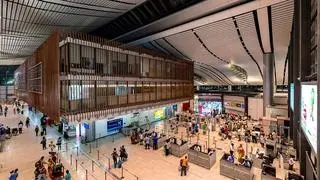The year-end results of two listed airline entities, IndiGo and SpiceJet, present contrasting pictures, and at the same time, are similar in some ways.
IndiGo was first off the block with its earnings reporting a net loss of ₹1,159 crore during the January-March quarter compared with ₹873 crore on a total income of ₹6,362 crore, which was 25 per cent lesser compared with the same period the previous year. SpiceJet reported a net loss of ₹235.34 for the same period compared with a ₹807 crore loss during the corresponding period for the last fiscal. Total income declined to ₹2,194.7 crore from ₹3,057 crore during Q4 FY20.
What do the results tell us about the mid-term future of the airline industry in the country even as the weekly average of daily fliers continue to rise, and the government, responding to the declining Covid-19 cases, raising the cap on capacity from 15 per cent to 65 per cent? According to government reports, the intermediate daily fliers grew 18 per cent week-on-week (June 26-July 3) due to 11.4 per cent growth in departures and 5.9 per cent growth in the number of fliers per departure.
“Indigo and SpiceJet Q4 results indicate how much stress airlines have experienced. While Indigo lost ₹1,159 crore for the quarter, SpiceJet too posted a significant loss. Revenues continued to be weak propped up by policy measures (capacity caps and price floors),” Satyendra Pandey, Managing Partner of aviation consultancy firm, Airavat Transport & Technology Ventures, said.
What caught the analysts by surprise was that the losses were higher than expected even though the second wave of the pandemic had not hit the country during the January-March quarter. Hence, as a buffer against any unforeseen headwinds cropping up during the year, both airlines are now planning to raise fresh cash. IndiGo plans to raise ₹3,000 crore through QIP even though it is sitting on cash and equivalents of around ₹7,100 crore, while SpiceJet intends to raise ₹2,500 crore to fund its working capital requirements.
Analysis of the results throws up several reasons for the poor performance from the airlines, triggered, of course, by the pandemic. The airlines will have to bring about structural changes to run their operations from now on.
At IndiGo, Ashish Shah and Vaibhav Shah, analysts with Centrum Institutional Research, said the airlines’ losses were primarily due to rising ATF prices and lower yields. Revenue per km yield declined 1.2 per cent year to ₹3.7, which was below the estimated ₹3.9 led by a slowdown in traffic recovery and softer fares. In addition, the increase in ATF prices by about 25 per cent quarter-on-quarter led to an increase in cash burn from ₹15 crore per day in Q3FY21 to ₹19 crore per day in Q4FY21.
SpiceJet’s financial situation was already relatively weak when the pandemic hit the industry. Its balance sheet suffers from negative equity of ₹2,600 crore and gross borrowing without lease liability of ₹4,400 crore as at FY21-end. What came to the airline’s rescue was its cargo operations, an intelligent move by the airline to increase focus on a process that yielded immediate results and sustained its operations. As a result, its cargo revenues grew a whopping 518 per cent to ₹1,120 crore in FY21, while net profit from cargo operations was ₹130 crore in FY21 against a loss of ₹134 crore in FY20. Some international airlines, such as China Airlines and Korea Airlines, which managed to post profits during 2020, had followed the same model. However, according to Ansuman Deb and Ravi Kurva of ICICI Securities, while dedicated cargo initiative is commendable, the cargo momentum can slow down with the return of the belly space.
The outlook, however, is dim for both airlines. Analysts expect both IndiGo and SpiceJet to register higher losses as the full force of the second wave had impacted the April-June (Q1) quarter. In addition, the rising input cost inflation will further stretch the industry’s finances.
Airavat’s Pandey puts the situation in perspective when he points out that for both the airlines, cash is the need of the hour and where that will come from remains to be seen. “As someone famously said, ‘Cash is a fact; profit is an opinion’ and looking at the financials one sees just that”. From now on, airlines may have to take a tough call on several issues. However, they will be looking forward to a helping hand from the new civil aviation minister Jyotiraditya Scindia, who, from all accounts, should play a vital role in the industry’s revival.
K Giriprakash








Comments
Comments have to be in English, and in full sentences. They cannot be abusive or personal. Please abide by our community guidelines for posting your comments.
We have migrated to a new commenting platform. If you are already a registered user of TheHindu Businessline and logged in, you may continue to engage with our articles. If you do not have an account please register and login to post comments. Users can access their older comments by logging into their accounts on Vuukle.